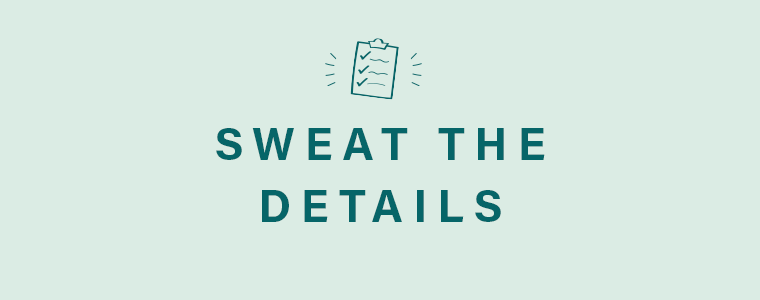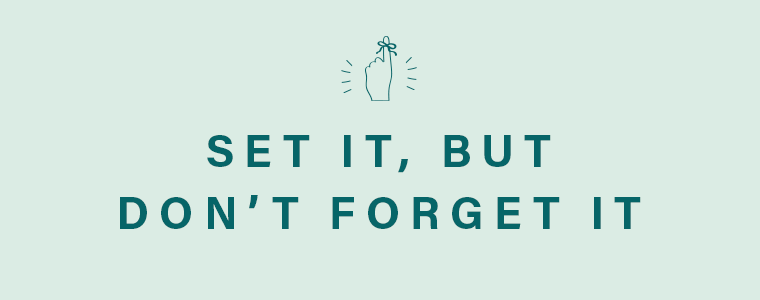How to Spend Less, Save More, and Clean up Your (Financial) Act
You can feel it: 2018 is the year you finally get your financial s**t together. But before you can put new, healthy financial habits into place—Start a 401(k)! Get control of your credit card debt! Pay off your student loans!—you need to take a good, honest look at the wounds you've inflicted on your budget. Chase Slate Financial Education Ambassador Farnoosh Torabi is here to help you rip off the Band-Aid. Promise: This will only hurt a little.

There’s almost nothing less fun than looking over your bank statements and realizing you spent $150 on lattes last month. That’s probably why so many of us avoid looking at our statements at all, unless something’s obviously wrong—we’d rather not be reminded of the damage we’re doing.
But it all adds up, and even seemingly insignificant expenses (like that daily $5 matcha break) may be more of a problem than you realize. If you’re determined to make 2018 the year you finally achieve the goals you’ve been focused on for so long (#adulting), you’re going to want to detoxify your spending habits—just like you’d cut back on sugar or alcohol after a month filled with cookie baking and boozy holiday parties. Yes, it’s hard work up front, but if you’re looking to tackle a major life change—whether that’s buying a house, or getting out of debt, or going to grad school—you need money to make it happen.

{{post.sponsorText}}
Here’s how to make sure every dime you earn is helping get you to a better place.

1. Sweat the details
The first step, as daunting as it may seem, is to figure out where every penny you earn is going right now. That means printing out your credit card and bank statements (yes, every single one of them), grabbing a notepad, and diving in.
Create two columns: “needs” and “wants.” Anything that falls into the “needs” category is a non-negotiable: housing, car insurance, debt repayments. “Wants” are things like travel, clothes, dining out, and your souped up smartphone. As you go down the line, be on the lookout for surprises in both categories—you’ve probably forgotten about some of the things you’re paying for. (I recently realized I was still paying $10 a month for Gogo inflight WiFi, which I meant to cancel once the free trial was over. It happens!) The most important thing here is to be honest about what it is you really need. You need a cell phone to stay in touch with friends and family and to stay on top of things at work, but do you really need an iPhone X?
One need that often goes overlooked: your savings. You should be devoting around 20 percent of your take-home pay to savings and debt repayment. If you aren’t quite there, or if you’d like to go above and beyond in the pursuit of a particular goal, free up some funds by looking for changes you can make to both your “wants” and your “needs.”
2. Cut it out
It is possible to spend less on the essentials without making huge lifestyle changes. If there isn’t much left over for savings once you pay your rent or your mortgage, think about getting a “sometimes” roommate—that is, use Airbnb to rent your spare bedroom out to travelers, or your entire apartment if you’re going to be out of town. That could net you hundreds of dollars every month. Or if your credit card payments feel like too much of a burden, see if you can transfer your balance to a card with 0 percent APR (that means you may not have to pay interest on what you owe for a year or more).
Cutting back on the non-essentials is much easier. Food is a necessity, but is ordering Seamless every night a necessity? Probably not. Give yourself a couple of evenings off each week for delivery or dinners out with friends, but the rest of the time, commit to cooking (or assembling, if that’s more your speed). You could save $50, $60, or even close to $100 each week just by packing your lunch every day.
3. Do the (side) hustle
If you’ve pared down your expenses and you’re still feeling squeezed, you’re going to want to look into making more money. I promise it’s not as hard as it sounds, and it doesn’t mean you have to march into your boss’ office and demand a raise right this second. Instead, make like the estimated 34 percent of Americans who take part in the gig economy.
There are now more ways than ever to monetize your talents or to make money off the stuff you already own. If you love animals, try pet-sitting a couple of times a month through a site like Rover.com. Have a car? Sign up with a service like TaskRabbit (you need to submit an application and attend an orientation to join) and help neighbors run errands or haul furniture. It’s kind of cool to learn to juggle multiple income streams, and some people find they really enjoy thinking like an entrepreneur—so much so that they decide to turn their side gigs into full-time jobs.
4. Know the score
Taking stock of your money habits involves more than just combing through your bank statements. Understanding your credit profile (AKA your credit score and your credit report) can get you a long way towards achieving your goals. If you want to buy a car, or a home, or do anything that requires taking out a loan, your credit rating matters a lot. It’s going to determine whether you qualify for more credit, and what kinds of interest rates will be attached to the credit you do qualify for. The higher your score—if it’s above 750, you’re in good shape—the more likely you’ll be to earn a lower interest rate, which ultimately means more money in your pocket. A difference of even just half a percentage point on an interest rate can save you hundreds (or even thousands) of dollars over the course of your loan.
There are a number of easy, free ways to keep tabs on your credit score. You’re legally entitled to a free copy of your credit report each year from each of the three major credit bureaus; sites like AnnualCreditReport.com make it easy to sign up for all three reports in one place. For a more immediate sense of your standing, some credit cards—like Chase Slate, for instance—give customers access to a credit dashboard, where they can check their credit scores as often as they want for free.
5. Set it, but don’t forget it
You’ve figured out how much money you have coming in and exactly how much you can afford to part with each month. The biggest challenge now? Staying on track. Use technology to your advantage by automating your monthly bills and leaning on an app or a website to keep tabs on how well (or not) you’re sticking with the rules you set out for yourself. You Need a Budget is a popular one—it links to your accounts and assigns every dollar that comes in a “job,” which takes a lot of the guesswork out of it. Full disclosure: After your initial free trial period, the software costs $6.99 per month, but it's worth the investment.
6. Ask, and you might receive
You should never be afraid to ask for a break. Those surprise Gogo WiFi charges I saw on my statement recently? I called and said, “I didn’t even realize I was still paying for this. Is there anything you can do?” Those are the key words: “Is there anything you can do?” I didn’t get a full refund, but customer service gave me back the cost of three of the six months I’d paid.
If you have a car, look at how much you’re paying for car insurance. It could be worth it to call your insurance company and say, “Hey, I’m not driving as much as I used to because I work from home once a week now.” Or, “I have a really good track record. Can you do better?” There are so many competing agencies out there, some of which may be able to offer up a better rate. If yours won’t come down, it may be time to switch.
7. Phone a friend
It’s really important not to budget in a silo. Let your friends and family know you’re trying to spend less and save more; that way, they’re aware that this is a priority for you and can offer up the support you need. (It may even inspire them to start doing the same.) And, if you can, find a budget buddy—sort of like a workout buddy, but for your money. Commit to checking in with one another every few weeks and swap tips. They’ll help hold you accountable; you’ll help hold them accountable; and you’ll both be that much closer to living the lives you want and deserve.
Farnoosh Torabi is one of America’s leading personal finance authorities. From her early days reporting for Money magazine to hosting a primetime series on CNBC to becoming a Chase Slate Financial Education Ambassador, she’s become a go-to money expert. Millions of Americans tune into Farnoosh’s award winning podcast, So Money, and her work and advice have been featured in The New York Times, The Wall Street Journal, O, The Oprah Magazine, Fortune, Forbes and Time. For more, check out www.Farnoosh.TV.
There’s some powerful New Year’s energy in the air, and we can’t wait to help you harness all of it. Now that you're on track to clean up your finances, learn how to detoxify your mindset, diet, home, and more.
Loading More Posts...





